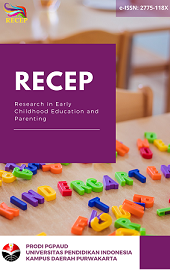IMPLEMENTATION OF UNPLUGGED CODING IN PLAYDATE
Abstract
Pendidikan global semakin menyadari pentingnya mengintegrasikan keterampilan berpikir komputasional sejak usia dini, untuk mempersiapkan anak-anak menghadapi tantangan di masa depan. Penelitian ini bertujuan untuk mengeksplorasi penerapan pendekatan unplugged coding dalam mengembangkan kemampuan CT pada anak usia dini di Playdate Zona Kreativa, Bandung. Pendekatan unplugged coding memungkinkan pengenalan konsep pemrograman dasar melalui kegiatan fisik dan permainan sederhana, tanpa menggunakan teknologi digital. Untuk memahami bagaimana para pendidik mengimplementasikan pendekatan ini dan kompetensi apa saja yang diperoleh anak, penelitian ini menggunakan desain studi kasus. Data diperoleh melalui wawancara terstruktur dan observasi non-partisipan. Hasil penelitian menunjukkan bahwa pemahaman guru terhadap unplugged coding cukup baik, meskipun masih ada beberapa tantangan dalam implementasi sehari-hari. Contoh implementasi yang diamati menunjukkan bahwa pendekatan ini mampu memperkenalkan konsep dasar CT kepada anak-anak dengan cara yang interaktif dan menyenangkan. Studi ini merekomendasikan perlunya pelatihan lebih lanjut untuk guru dan penyesuaian materi agar lebih sesuai dengan kebutuhan anak usia dini.
Keywords
Full Text:
HAL 79-98References
Agustin, M. (2018). Mengenali dan mengembangkan potensi kecerdasan jamak anak sejak dini sebagai tonggak awal melahirkan generasi emas. Cakrawala Dini: Jurnal Pendidikan Anak Usia Dini, 4(2). https://doi.org/10.17509/cd.v4i2.10390
Bers, M. U., González-González, C. & Armas-Torres, M. B. (2019). Coding as a playground: Promoting positive learning experiences in childhood classrooms. Computers and Education, 138, 130–145. https://doi.org/10.1016/j.compedu.2019.04.013
Edwards, S. (2017). Play-based learning and intentional teaching: Forever different? Australasian Journal of Early Childhood, 42(2), 4–11. https://doi.org/10.23965/AJEC.42.2.01
Elkin, M., Sullivan, A. & Bers, M. U. (2016). Programming with the KIBO Robotics Kit in Preschool Classrooms. Computers in the Schools, 33(3), 169–186. https://doi.org/10.1080/07380569.2016.1216251
Fessakis, G., Gouli, E. & Mavroudi, E. (2013). Problem solving by 5–6 years old kindergarten children in a computer programming environment: A case study. Computers & Education, 63, 87–97. https://doi.org/10.1016/j.compedu.2012.11.016
Harahap, M. & Eliza, D. (2022). E-modul pembelajaran coding berbasis pengenalan budaya indonesia untuk meningkatkan computational thinking. Jurnal Obsesi : Jurnal Pendidikan Anak Usia Dini, 6(4), 3063–3077. https://doi.org/https://doi.org/10.31004/obsesi.v6i4.2314
Howland, K., Good, J., Robertson, J. & Manches, A. (2019). Editorial — Special issue on computational thinking and coding in childhood. International Journal of Child-Computer Interaction, 19, 93–95. https://doi.org/10.1016/j.ijcci.2018.11.001
Lee, J., Joswick, C. & Pole, K. (2023). Classroom play and activities to support computational thinking development in early childhood. Early Childhood Education Journal, 51(3), 457–468. https://doi.org/10.1007/s10643-022-01319-0
Misirli, A. & Komis, V. (2023). Computational thinking in early childhood education: The impact of programming a tangible robot on developing debugging knowledge. Early Childhood Research Quarterly, 65, 139–158. https://doi.org/10.1016/j.ecresq.2023.05.014
Muklason, A., Riksakomara, E., Mahananto, F., Djunaidy, A., Vinarti, R. A., Anggraeni, W., Nurita, R. T., Utamima, A., Fauzia, R., Theresia, L. W., Fikri, M. A., Propitadewa, H., Habibah, J. H., Prasetyo, J. D., Permatasari, S. T. I., Risnina, N. N., Tsaniyah, N. D. & Maulana, M. D. (2023). Coding for kids: Pengenalan pemrograman untuk anak sekolah dasar sebagai literasi digital baru di industri 4.0. Sewagati, 7(3). https://doi.org/10.12962/j26139960.v7i3.506
Munawar, M., Suciati, S., Saputro, B. A. & Luthfy, P. A. (2023). Evaluasi program literasi Digital di PAUD melalui robokids STEAM coding game. Jurnal Obsesi : Jurnal Pendidikan Anak Usia Dini, 7(2), 1836–1846. https://doi.org/10.31004/obsesi.v7i2.4140
Otterborn, A., Schönborn, K. J. & Hultén, M. (2020). Investigating preschool educators’ implementation of computer programming in their teaching practice. Early Childhood Education Journal, 48(3), 253–262. https://doi.org/10.1007/s10643-019-00976-y
Papadakis, Stamatios. (2022). Apps to promote computational thinking and coding skills to young age children: A pedagogical challenge for the 21st century learners. Educational Process International Journal, 11(1). https://doi.org/10.22521/edupij.2022.111.1
Papadakis, Stamatis. (2021). The impact of coding apps to support young children in computational thinking and computational fluency. A literature review. Frontiers in Education, 6. https://doi.org/10.3389/feduc.2021.657895
Pollarolo, E., Papavlasopoulou, S., Granone, F. & Reikerås, E. (2024). Play with coding toys in early childhood education and care: Teachers’ pedagogical strategies, views and impact on children’s development. A systematic literature review. Entertainment Computing, 50, 100637. https://doi.org/10.1016/j.entcom.2024.100637
Putri, D. I. H., Ridwan, T., Majid, N. W. A., Putri, H. E., Zakaria, D. & Nugroho, Y. A. (2022). Computational thinking and coding for kids training for elementary school teachers. REKA ELKOMIKA: Jurnal Pengabdian Kepada Masyarakat, 3(3), 142–151. https://doi.org/10.26760/rekaelkomika.v3i3.142-151
Saxena, A., Lo, C. K., Hew, K. F. & Wong, G. K. W. (2020). Designing unplugged and plugged activities to cultivate computational thinking: An exploratory study in early childhood education. The Asia-Pacific Education Researcher, 29(1), 55–66. https://doi.org/10.1007/s40299-019-00478-w
Sopiah, N. S., Sima, M. & Loita, A. (2023). Implementasi pembelajaran steam melalui permainan coding robotik dalam melatih problem-solving anak usia dini . NANAEKE: Indonesian Journal of Early Childhood Education, 6(2), 113–134. https://doi.org/https://doi.org/10.24252/nananeke.v6i2.39735
Strawhacker, A. & Bers, M. U. (2019). What they learn when they learn coding: investigating cognitive domains and computer programming knowledge in young children. Educational Technology Research and Development, 67(3), 541–575. https://doi.org/10.1007/s11423-018-9622-x
Strawhacker, A., Lee, M. & Bers, M. U. (2018). Teaching tools, teachers’ rules: exploring the impact of teaching styles on young children’s programming knowledge in ScratchJr. International Journal of Technology and Design Education, 28(2), 347–376. https://doi.org/10.1007/s10798-017-9400-9
Su, J. & Yang, W. (2023). A systematic review of integrating computational thinking in early childhood education. Computers and Education Open, 4, 100122. https://doi.org/10.1016/j.caeo.2023.100122
Suhendro, E. (2022). Coding kids sebagai langkah pengembangan literasi digital bagi anak usia dini . Proceedings of The 6th Annual Conference on Islamic Early Childhood Education, 235–242. http://conference.uin-suka.ac.id/%20index.php/aciece
Sutojo, T., Rustad, S., Akrom, M. & Herowati, W. (2024). Implementasi computational thinking pada kurikulum merdeka menggunakan metode unplugged programming activity (UPA). Abdimasku, 7(1), 106–115.
Zeng, Y., Yang, W. & Bautista, A. (2023a). Computational thinking in early childhood education: Reviewing the literature and redeveloping the three-dimensional framework. Educational Research Review, 39, 100520. https://doi.org/10.1016/j.edurev.2023.100520
Zeng, Y., Yang, W. & Bautista, A. (2023b). Teaching programming and computational thinking in early childhood education: a case study of content knowledge and pedagogical knowledge. Frontiers in Psychology, 14.
DOI: https://doi.org/10.17509/recep.v5i2.75926
Refbacks
- There are currently no refbacks.
Copyright (c) 2024 Research in Early Childhood Education and Parenting

This work is licensed under a Creative Commons Attribution-ShareAlike 4.0 International License.

This work is licensed under a Creative Commons Attribution 4.0 International License.



